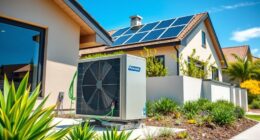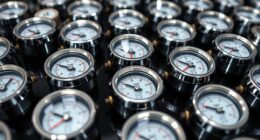Are you prepared to delve into the intricacies of heat pump refrigeration components? Look no further! Our interactive guide is here to assist you.
From the compressor to the evaporator coil, condenser coil, expansion valve, and more, we’ve got you covered.
With our user-friendly interface, you’ll be able to navigate through the intricate details of these components with ease.
Get ready to become an expert in heat pump refrigeration – let’s embark on this journey together!

Key Takeaways
- Regular maintenance is crucial for the efficiency and optimal performance of heat pump refrigeration components, such as the compressor, evaporator coil, and condenser coil.
- The condenser coil plays a crucial role in the heat transfer process by removing heat from the refrigerant, and regular cleaning is essential for optimal heat transfer.
- Expansion valves, such as thermostatic expansion valves (TXVs) and electronic expansion valves (EEVs), are essential for maintaining system efficiency and functionality, as they optimize the heat transfer process and protect the system from damage.
- The choice of refrigerant has a significant impact on the environmental sustainability of the heat pump system, and using refrigerants with low global warming potential (GWP) and ozone depletion potential (ODP) is important. The reversing valve allows switching between heating and cooling modes by changing the direction of refrigerant flow, and its proper maintenance and troubleshooting are necessary for optimal heat pump performance.
Compressor
In this section, we’ll examine the role of the compressor in heat pump refrigeration systems. The compressor plays a vital role in the efficiency of the system, as it’s responsible for pressurizing the refrigerant and transferring heat between the indoor and outdoor units.
It works by compressing the low-pressure refrigerant gas, increasing its temperature and pressure. This high-pressure gas then flows to the condenser, where it releases heat into the outside air.
To ensure compressor efficiency, regular maintenance is crucial. Keep the compressor clean and free from debris to prevent overheating. Additionally, check the compressor’s oil level and condition regularly.
Troubleshooting tips for compressor issues include checking for unusual noises, abnormal vibrations, and proper electrical connections.

Evaporator Coil
What role does the evaporator coil play in our heat pump refrigeration system?
The evaporator coil is a crucial component that’s responsible for absorbing heat from the indoor air. It works by circulating refrigerant through a series of small tubes, which are surrounded by the warm air from the room.
As the refrigerant passes through the coil, it undergoes a phase change from a liquid to a gas, absorbing heat in the process. This cooled air is then distributed back into the room, providing a comfortable indoor climate.
Maintaining the efficiency of the evaporator coil is essential for optimal performance of the heat pump system. Regular cleaning and inspection of the coil, as well as ensuring proper airflow, can help maximize its efficiency and prolong the lifespan of the heat pump.

Condenser Coil
Let’s begin by understanding the cooling process in a heat pump system.
The condenser coil plays a crucial role in this process, as it’s responsible for releasing heat from the refrigerant to the surrounding air.
This heat exchange allows the refrigerant to cool down and turn back into a liquid state, completing the refrigeration cycle.
To ensure optimal performance and longevity of the condenser coil, regular maintenance is essential.
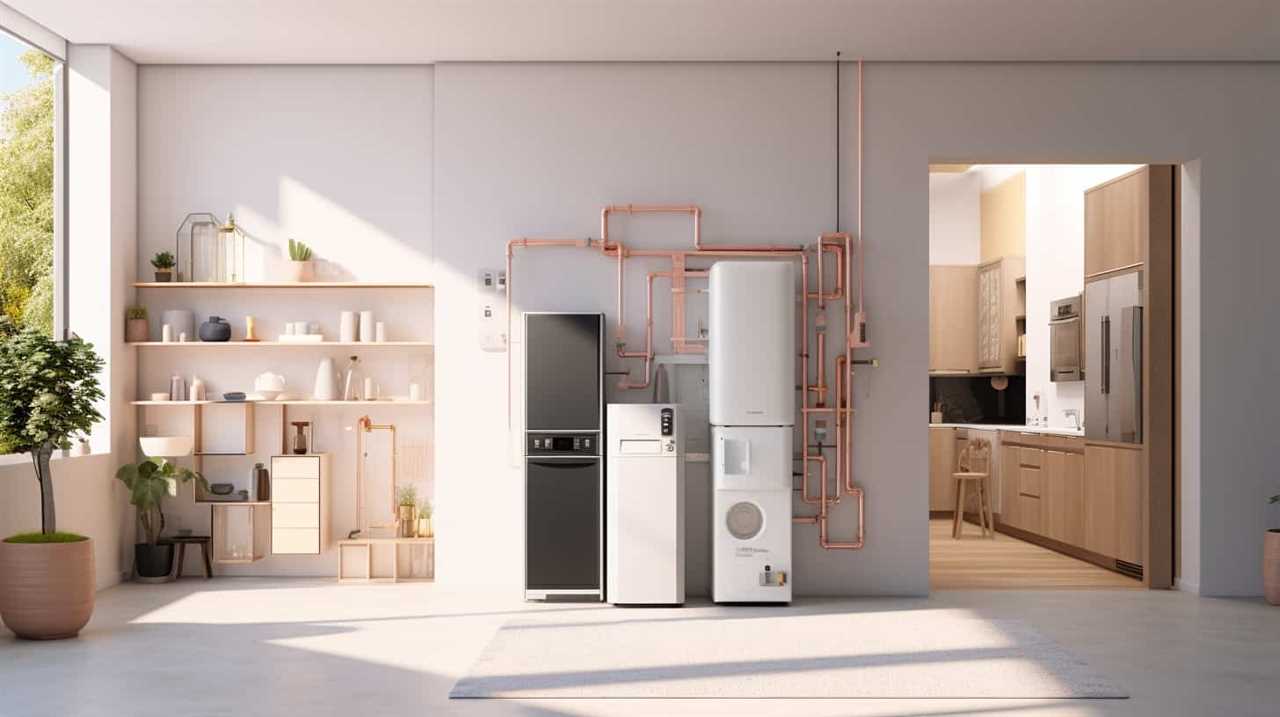
Cooling Process Explained
We use a condenser coil to remove heat from the refrigerant and cool it down. As part of the cooling cycle, the condenser coil plays a crucial role in the heat transfer process.
When the high-pressure refrigerant vapor enters the condenser coil, it comes into contact with the cooler air or water flowing around the coil. This contact causes the refrigerant to release heat and transform into a high-pressure liquid.
The heat transfer occurs as the refrigerant transfers its thermal energy to the surrounding medium, effectively cooling down in the process. This cooled liquid refrigerant then continues its journey through the refrigeration system.
With the cooling process explained, we can now move on to discussing the importance of the condenser coil in the heat pump refrigeration system.

Importance of Condenser Coil
One important aspect of the heat pump refrigeration system is the condenser coil, which helps remove heat from the refrigerant and aids in the cooling process. The condenser coil plays a crucial role in maintaining the efficiency and performance of the heat pump.
Here are three key points to consider regarding the condenser coil:
Condenser Coil Materials: The choice of materials for the condenser coil is crucial as it determines its durability and ability to transfer heat effectively. Common materials used include copper and aluminum, both known for their excellent heat transfer properties.
Condenser Coil Cleaning: Regular cleaning of the condenser coil is essential to ensure optimal heat transfer. Accumulated dirt, debris, and grime can reduce the coil’s efficiency, leading to decreased cooling performance. Cleaning the coil periodically helps maintain its efficiency and prolong the lifespan of the heat pump.
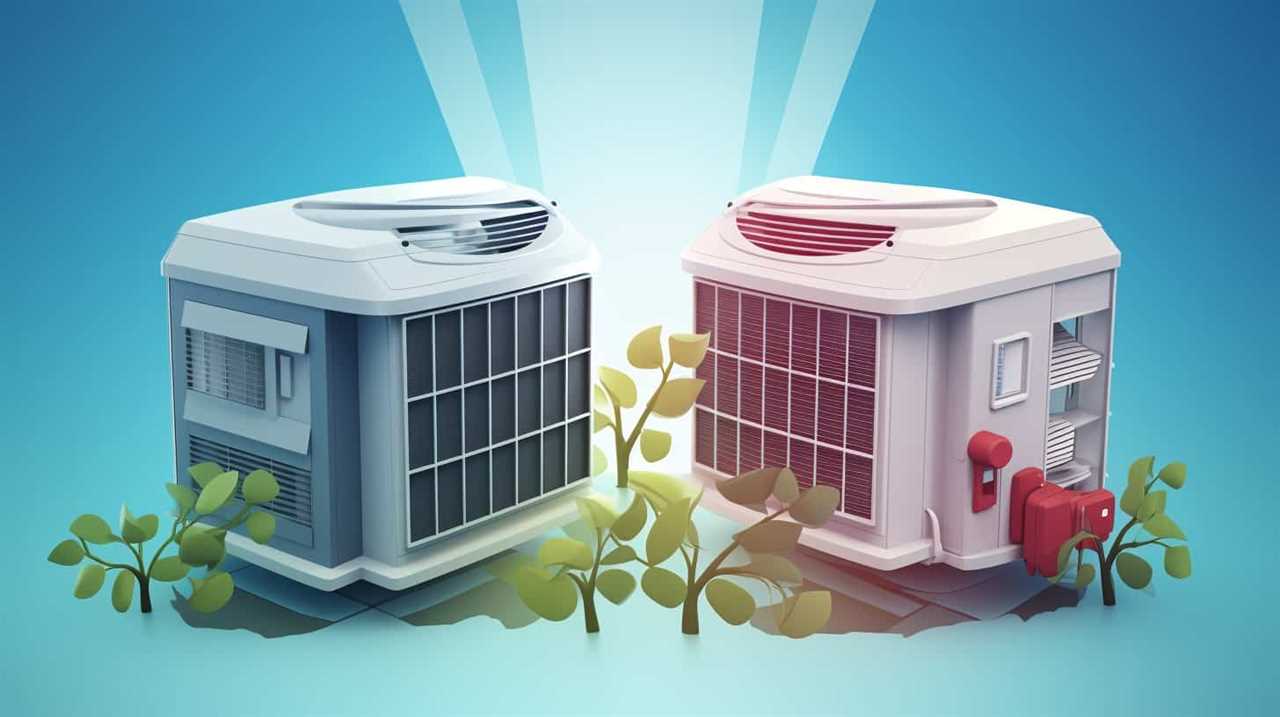
Understanding the importance of condenser coil materials and regular cleaning is vital for maintaining the efficiency and longevity of the heat pump refrigeration system.
Moving forward, let’s explore some maintenance tips to ensure the system’s longevity.
Maintenance Tips for Longevity
How often should we clean the condenser coil to ensure its longevity and optimal performance?
Regular maintenance of the condenser coil is essential for the smooth operation of a heat pump. Accumulated dirt, debris, and grime can hinder the airflow and reduce the system’s efficiency. To prevent this, it’s recommended to clean the condenser coil at least once a year, or more frequently in dusty or polluted environments.

Start by turning off the power to the heat pump and removing any debris from the coil using a soft brush or vacuum cleaner. Then, apply a coil cleaner and let it sit for a few minutes before rinsing it off with water. It’s important to avoid using high-pressure water or abrasive materials that could damage the coil.
Expansion Valve
The expansion valve plays a crucial role in the efficiency and functionality of a heat pump refrigeration system. It’s responsible for regulating the flow of refrigerant from the high-pressure side to the low-pressure side of the system, allowing for the expansion and cooling of the refrigerant.
There are different types of expansion valves, including thermostatic expansion valves and electronic expansion valves, each with their own applications and advantages.
Efficiency and Functionality
Our efficiency and functionality are greatly improved with the use of an expansion valve in the heat pump refrigeration system. The expansion valve plays a crucial role in regulating the flow of refrigerant within the system, ensuring optimal performance and energy savings.

Here are three key benefits of using an expansion valve:
Enhanced Heat Pump Efficiency: The expansion valve allows for precise control of the refrigerant flow rate, which optimizes the heat transfer process. This results in improved energy efficiency and reduced operating costs for heat pump installations.
Improved System Functionality: By regulating the refrigerant flow, the expansion valve helps maintain the desired temperature in both heating and cooling modes. This ensures consistent and reliable performance of the heat pump system.
Long-Term Reliability: The expansion valve helps protect the heat pump system from potential damage caused by excessive pressure or inadequate refrigerant flow. This increases the lifespan of the system and reduces the need for costly repairs or replacements.
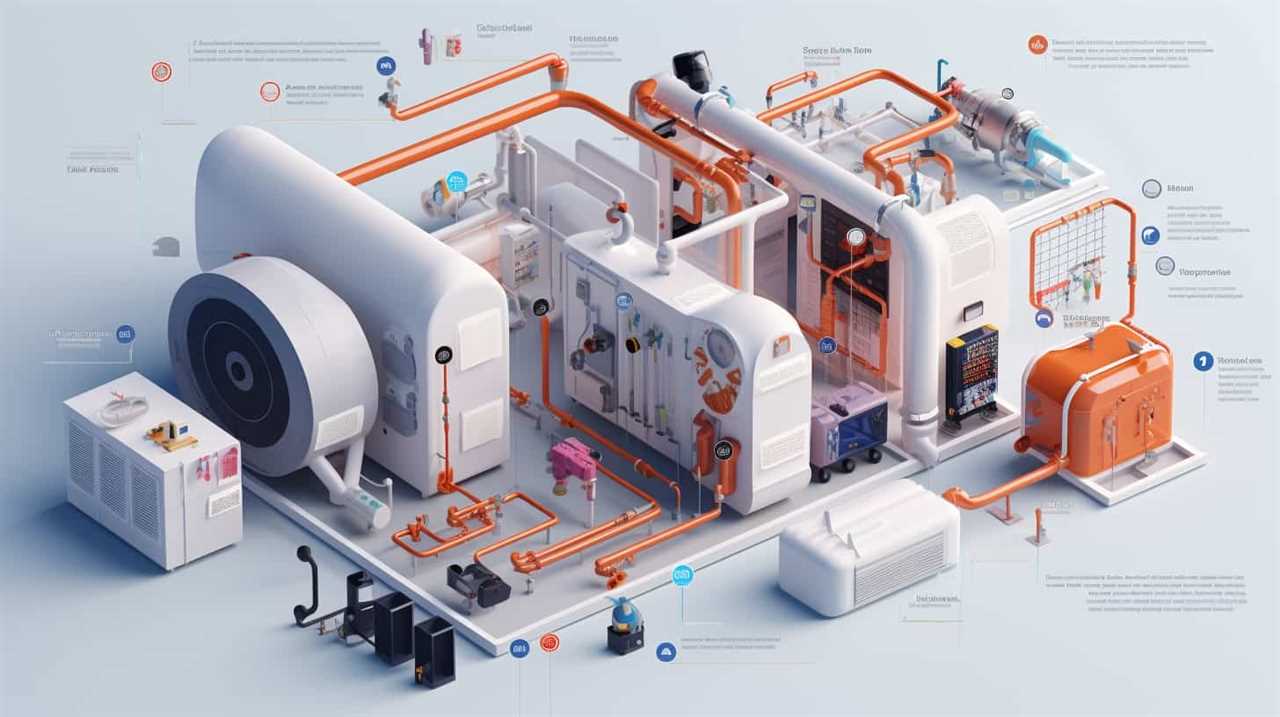
With these benefits, the expansion valve is a critical component that contributes to the overall efficiency and functionality of heat pump refrigeration systems.
Now, let’s explore the different types and applications of expansion valves.
Types and Applications
Expansion valves play a crucial role in regulating the flow of refrigerant throughout the heat pump system. There are mainly two types of expansion valves commonly used: thermostatic expansion valves (TXVs) and electronic expansion valves (EEVs).
TXVs are widely used in heat pump technology due to their simplicity and reliability. They work by sensing the temperature and pressure of the refrigerant and then adjusting the size of the valve opening accordingly. This allows for precise control of the refrigerant flow, optimizing the system’s energy efficiency.

On the other hand, EEVs are more advanced and offer greater precision in regulating the refrigerant flow. They use electronic sensors and control algorithms to constantly monitor and adjust the valve opening, ensuring optimal performance under varying conditions.
Both types of expansion valves are essential for maintaining the efficiency and functionality of heat pump refrigeration systems. By accurately controlling the flow of refrigerant, they contribute to energy savings and overall system performance.
Refrigerant
We use refrigerant to transfer heat in our heat pump system. Refrigerant is a crucial component that plays a vital role in the efficiency and environmental impact of our heat pump.
Here are three key points about refrigerant properties and its environmental impact:

Thermodynamic Properties: Refrigerants have specific thermodynamic properties that determine their efficiency in transferring heat. These properties include boiling point, latent heat, and specific heat capacity. Understanding these properties helps us select the most suitable refrigerant for our heat pump system.
Environmental Impact: The choice of refrigerant greatly affects the environmental impact of our heat pump system. Some refrigerants, such as chlorofluorocarbons (CFCs) and hydrochlorofluorocarbons (HCFCs), contribute to ozone depletion and global warming. It’s essential to use refrigerants that have low global warming potential (GWP) and ozone depletion potential (ODP) to minimize the environmental impact.
Regulations and Standards: To mitigate the environmental impact, various regulations and standards have been established. These regulations aim to phase out ozone-depleting substances and reduce the greenhouse gas emissions associated with refrigerants. Compliance with these regulations ensures that our heat pump system aligns with environmental sustainability goals.
Reversing Valve
The reversing valve is a critical component that allows us to switch between heating and cooling modes in our heat pump system. It’s responsible for changing the direction of refrigerant flow, enabling the heat pump to provide both warm and cool air. In heating mode, the reversing valve directs the refrigerant to flow through the outdoor coil, absorbing heat from the outside air and releasing it inside. In cooling mode, it reverses the flow, allowing the heat pump to remove heat from the indoor air and release it outside.
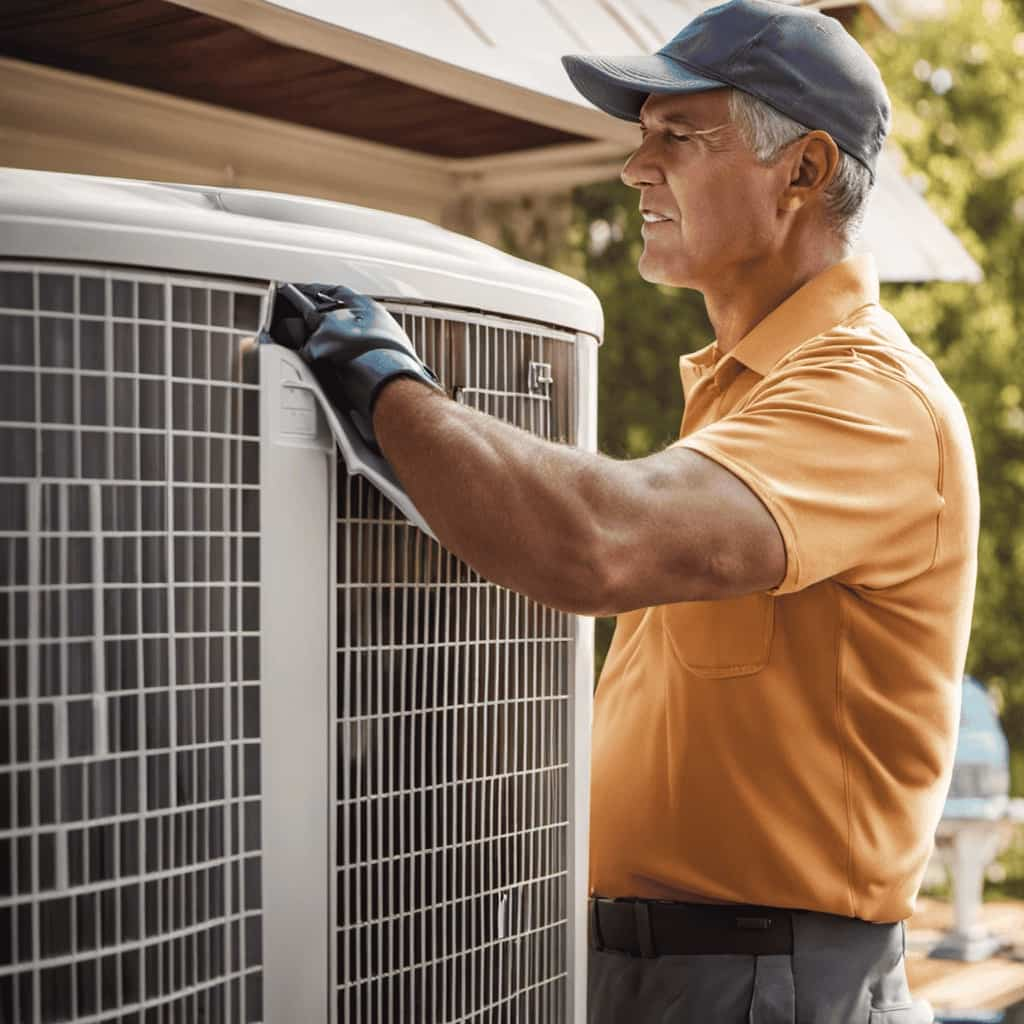
Reversing valve applications can vary depending on the specific heat pump design. Some heat pumps use a four-way reversing valve, while others may employ a three-way valve. Troubleshooting a reversing valve involves checking for proper electrical connections, ensuring that the valve is receiving the correct voltage, and inspecting for any signs of physical damage or refrigerant leaks. It’s also essential to verify that the valve is operating correctly and switching between heating and cooling modes as intended.
Frequently Asked Questions
How Does a Heat Pump System Differ From a Traditional Air Conditioning Unit?
A heat pump system differs from a traditional air conditioning unit in that it can both cool and heat a space. The key difference lies in the use of refrigerant to transfer heat, making heat pump systems more efficient than traditional AC units.
Are There Any Specific Maintenance Tasks That Need to Be Performed Regularly on a Heat Pump System?
Regular maintenance tasks are crucial for the proper functioning of a heat pump system. We understand the importance of heat pump maintenance and are here to guide you through the necessary steps to keep your system running efficiently.
Can a Heat Pump System Be Used for Both Heating and Cooling Purposes?
Yes, a heat pump system can be used for both heating and cooling. The advantages include energy efficiency, cost savings, and year-round comfort. Factors to consider when choosing a system include size, efficiency ratings, and compatibility with existing HVAC equipment.
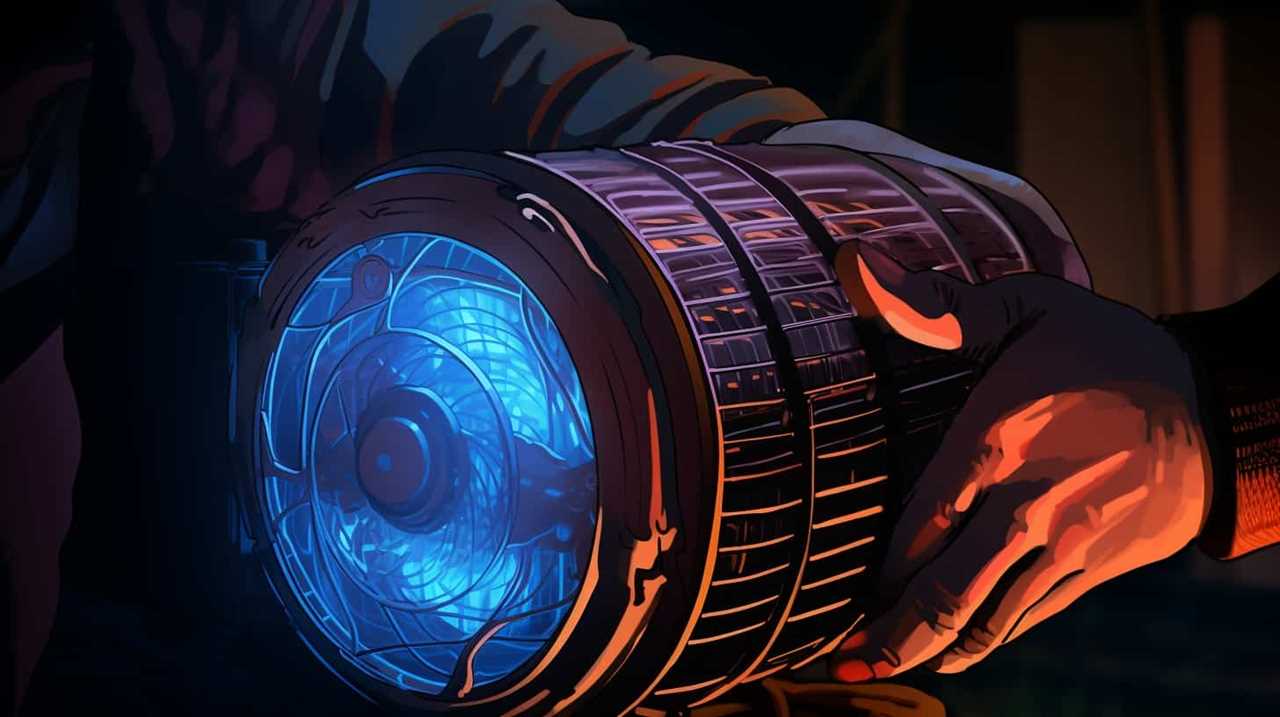
Are Heat Pump Systems More Energy-Efficient Compared to Other Heating and Cooling Options?
Yes, heat pump systems are more energy-efficient compared to other heating and cooling options. They utilize heat pump efficiency and offer benefits such as lower energy consumption, reduced greenhouse gas emissions, and cost savings.
How Long Does a Typical Heat Pump System Last Before It Needs to Be Replaced?
Heat pump systems typically last for about 15-20 years before needing replacement. Signs of a failing heat pump system include reduced heating or cooling performance, frequent breakdowns, and high energy bills.
What Are the Key Steps to Maintaining Heat Pump Refrigeration Components?
Maintaining a high-efficiency heat pump involves key steps to ensure optimal functioning. Regularly cleaning the outdoor coils helps prevent debris accumulation, while checking and replacing air filters supports airflow efficiency. Inspecting the indoor coil’s cleanliness and ensuring proper duct sealing enhances overall performance. Additionally, professional maintenance, including checking refrigerant levels and electrical connections, is crucial for longevity and efficient operation of a heat pump refrigeration system.
Conclusion
In conclusion, understanding the key components of heat pump refrigeration is crucial for anyone looking to delve into the technical aspects of this system.
One fascinating statistic to note is that heat pumps can achieve an impressive efficiency rating of up to 300%, meaning they can produce three times more heat than the energy they consume.

This efficiency makes heat pump refrigeration a sustainable and cost-effective solution for heating and cooling needs.






